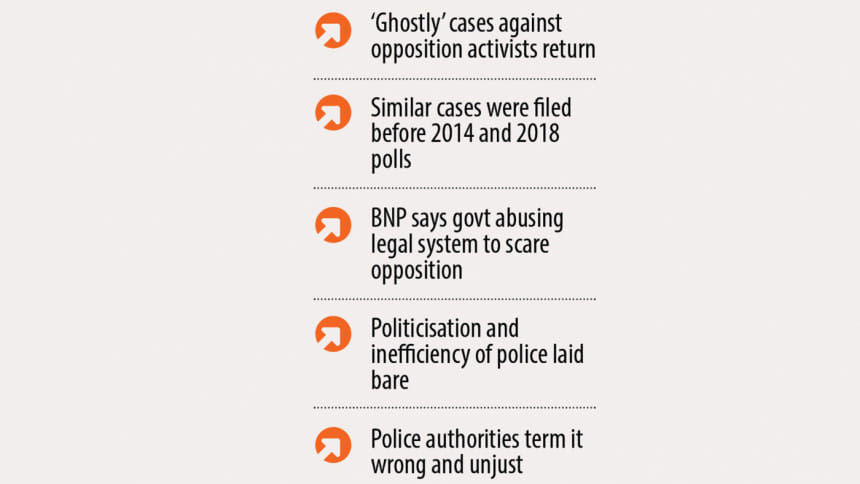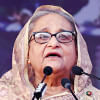Police see dead man running

Amin Uddin Mollah is dead and buried for two years and 10 months.

But a police officer in Gazipur "clearly saw" him and 21 others on the night of October 28 when the latter were fleeing after throwing a crude bomb at a police team, according to the case statement.
Sub-inspector Salahuddin of Gazipur's Kapasia Police Station filed the case the next day naming 22 people, including Amin, and many other unknown people, on charges of "attempting to kill police personnel".
The alleged incident took place in Targaon Medical Intersection area at 11:30pm, and the SI said in the case statement that he was able to clearly see the suspects under the street lights along the road.
"I do not know if the police officer saw Amin Uddin or his ghost. Or maybe Amin Uddin came out of his grave that night," said local union parishad member Mostafa Kamal.
Amin's son-in-law Mozammel Haque and his neighbour Md Saifullah of Khirati village said the man died on January 25, 2021, while undergoing treatment at a hospital in the capital. He was 65.
Mostafa Kamal, the local union parishad member, said Kapasia police even collected Amin's death certificate after his demise in 2021 in relation to a case at the time.
Amin retired as Narsingdi's Monohordi upazila education officer, and later joined Jamaat-e-Islami politics, three locals and a Jamaat leader said.
Md Abu Bakar Mia, officer-in-charge of Kapasia Police Station, said they will look into the matter.
BNP and Jamaat leaders have long been claiming that the government is using state machinery, including police, to suppress the opposition by implicating their leaders and activists in false cases.
Over the last one decade, filing of cases against dead people, migrant workers, hajj pilgrims and sick people travelling abroad for treatment made repeated headlines.
Often, such cases were filed immediately before and after elections, and in most instances, people involved in BNP and Jamaat politics have been the victims of these cases, sarcastically called "ghostly cases."
The hallmark of these cases is that the implicated persons were nowhere near the places of occurrence when the alleged crimes took place.
A similar trend has returned in recent weeks, especially centring on the October 28 opposition rally in the capital that was foiled by heavy police action.
According to BNP, at least 18,090 party leaders and activists were arrested in 475 cases across the country from October 28 to November 30.
Jamaat says law enforcers arrested 2,845 leaders and workers in 104 cases from October 25 to November 30.
Muhammad Ataur Rahman Sarker, publicity secretary of Jamaat's Dhaka north unit, said many of their leaders and activists have been victims of such false cases and enforced disappearances over the last several years.
Supreme Court lawyer Jyotirmoy Barua said filing of "ghostly" cases is a clear violation of fundamental rights of citizens.
"In the judicial system, those who file false cases can be prosecuted and punished," he added.
BNP Senior Joint Secretary General Ruhul Kabir Rizvi said police and ruling party activists are filing false cases by abusing the legal system to suppress the opposition leaders and activists.
Sheikh Mohammad Shamim, former Chhatra Dal leader of Gazipur City Corporation's Ward-54, is one such victim, who has nothing to do with the alleged crime but has been implicated nevertheless.
On October 26, police arrested him and 56 others from Tongi. Family members and sources in the court said Shamim was subsequently sent to jail.
But in a case filed on October 31 by Tongi police, Shamim has been charged with setting fire to a motorcycle and vandalising several vehicles in Tongi on October 30.
Contacted, SI Taim Uddin of Tongi West Police Station who filed the case said he would like to have a face-to-face conversation about the matter.
Al Amin Sarkar, a Jamaat supporter, from Brahmanbaria's Kasba is another.
On November 2, four days after BNP's Nayapaltan rally, Emdadul Haque Palash, former general secretary of local Chhatra League, sued 57 BNP-Jamaat leaders and supporters for "vandalising four bikes, beating him up and snatching Tk 2 lakh from him".
The alleged incident happened in Kasba municipality area at 7:40am.
Al Amin's immigration papers show he landed at Dhaka airport at 6:00am that day after performing Umrah in Saudi Arabia, where he flew on October 19.
Brahmanbaria is about 100km from Dhaka airport and is about four hours' journey.
Al Amin's wife Umme Habiba Fatema said her husband, a Jamaat supporter, came out of the airport around 8:30am after completing immigration formalities. The couple stayed at a cousin's house in Dhaka that night and the next day, and returned to Brahmanbaria on November 4.
Police arrested him from Kasba on November 5, she said.
In the same case, Emdadul named Deen Islam Bhuiyan as an accused although he was in prison at the time.
Deen Islam, 70, has been in jail since police arrested him on September 15 from Brahmanbaria, said his son Tanvir Bhuiyan.
Kasba Police Station Officer-in-Charge Mohammad Mohiuddin said a private citizen filed the case and that they would take appropriate measures after investigation.
Police in Magura filed two cases on November 1 and 3 against two men over political violence, when they were in Malaysia and Bahrain.
One of them is Alamin Kazi of Magura's Shalikha, an expatriate businessman in Malaysia. The other is Rajib Sikder, an expat in Bahrain.
Travel documents, family members and both the expats confirm that they were not in Bangladesh on those dates.
"Like in 2013 and 2018, the government is trying to create panic among the people ahead of the election so they cannot take to the streets. Police are arresting our leaders and activists indiscriminately. They are employing such tactics so people do not rise up against the autocratic rule," Rizvi said.
Rights activist Nur Khan said police continue to file such cases as they are not held accountable for victimising innocent people.
"It is clear form the cases filed across the country that the accused are supporters of opposition parties. It shows that police are being used by the government for political gains," he said.
It also demonstrates police inefficiency, he said, adding, "Police have the list of opposition leaders and workers. So they use their names whenever they file a case without any verification."
Anwar Hossain, deputy inspector general (operations) at the Police Headquarters, said there are strict instructions for the local police to verify case-related information before pressing charges against anyone.
"If police filed cases against dead men or people already in jail, it is wrong and unjust on the part of the officers concerned. We will ask the units concerned to investigate and if anyone is found guilty of filing such cases, actions will be taken against them as per the rules," he told The Daily Star.
According to Supreme Court lawyer Jyotirmoy Barua, courts need to intervene in these matters as such cases may erode public trust in the judiciary.
"It is a matter of concern. I think such cases are a clear threat to the judicial system," he said.

 For all latest news, follow The Daily Star's Google News channel.
For all latest news, follow The Daily Star's Google News channel. 








Comments